Permaculture gardeners want to defy business school norm of neat green lawns
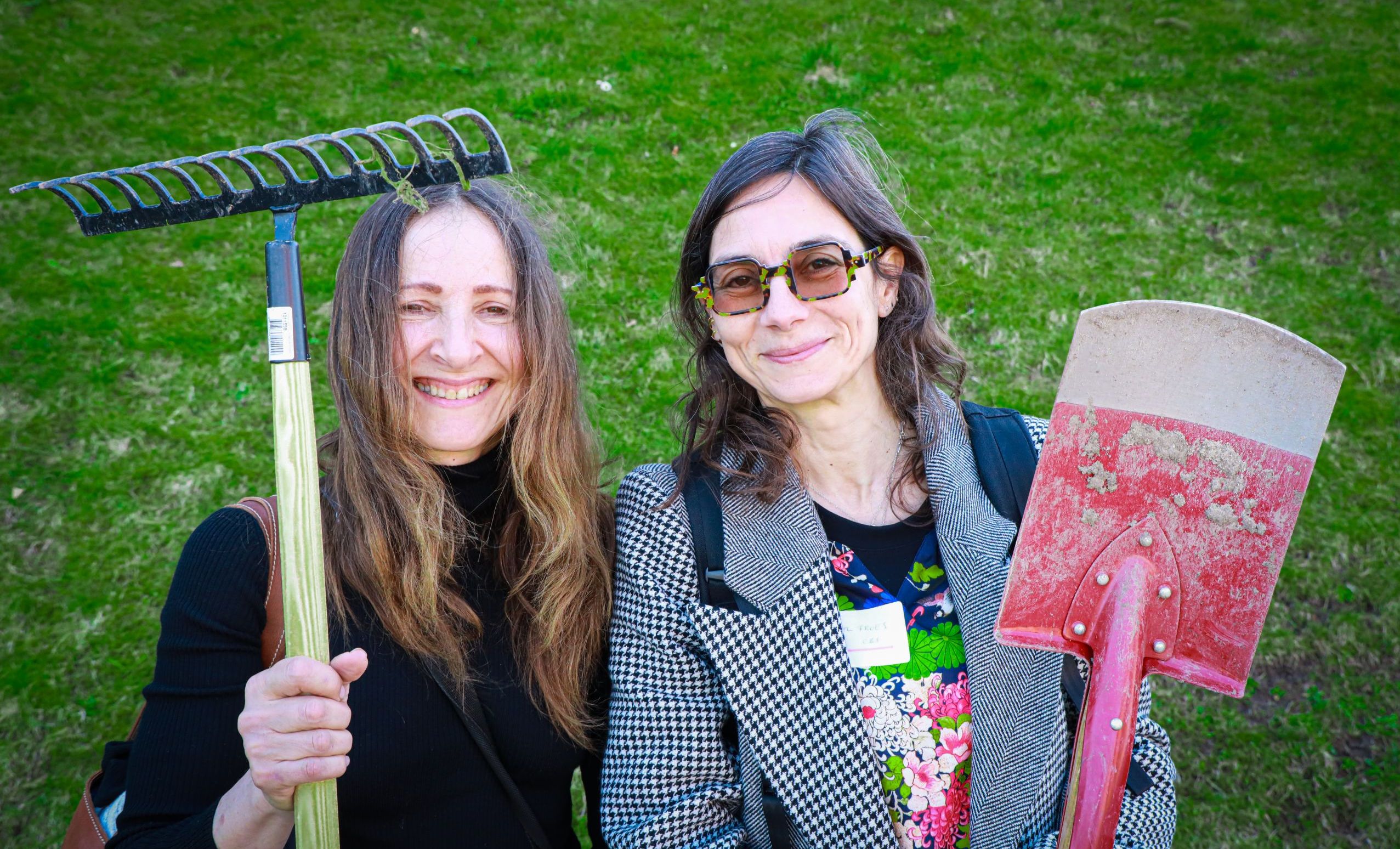
Maribel Blasco and Isabel Fróes call the permaculture garden their “passion project” – they have put many hours of their free time into it, but they hope to start using it for teaching at CBS. Photo: Anna Holte
Raised beds with berries and vegetables, wildflowers and professors with wheelbarrows and rakes – it might not be the typical image of a business school – but that could all change in the future. CBS faculty members Isabel Fróes and Maribel Blasco’s idea of creating a permaculture garden at CBS has finally set down roots. On a piece of land next to Kilen, they want to build a community around permaculture principles and rethink how the green spaces of the campus can be used. “It gives us a lot of energy and meaning,” says Maribel Blasco.
Squinting in the April sun, a small crowd has left the panel debates of the Green Business Forum and stepped outside for the only activity on the schedule that takes place in green surroundings.
On a plot of land partly hidden by the old water tower, Assistant Professor Isabel Fróes and Associate Professor Maribel Blasco are presenting their project: a garden for the CBS community and its neighbours.
The area is dominated by a big open space of trampled grass where a large puddle has accumulated the April rains. But at the back, you can glimpse a row of raised beds. Some plants, yet to be planted, lie scattered around on the soil.
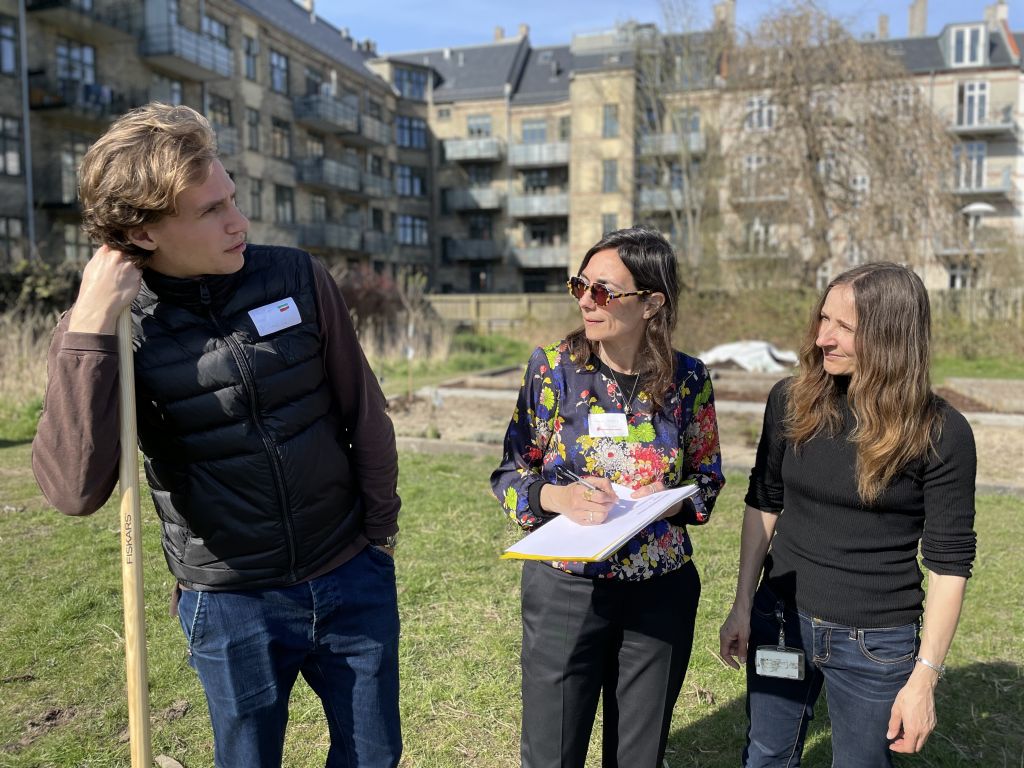
All sessions at the Green Business Forum need to bring a key message back to the organisers. After a bit of discussion they settle on: “rethinking businesses through permaculture principles”. “I think us having a hard time also tells a story about a project that is still being shaped constantly,” says Isabel Fróes (middle). Photo: Caroline Hammargren
“Permaculture offers a whole set of tools for rethinking traditional business models. For instance, it operates with an idea about yield that is different to the way we conceptualise it in business normally. In business, yield tends to be profit. In permaculture, we think about yield as a range of things. It could be joy, it could be aesthetic pleasure, it could be edible things. In a sense, it’s expanding our understanding of what yield can be,” Maribel Blasco says.
The two colleagues first came up with the idea three years earlier while discussing how to transform the campus in a department strategy meeting. The project idea was submitted to Campus Services, but due to COVID-19 and staff turnover, it took time to get started. Last fall, CBS finally allocated the space, and this spring, they started planting.
How can we give more than we take? How can we embed this in our businesses and in our urban development? This is an opportunity to bring these discussions into a different environment and change the way people learn.
Isabel Fróes, Assistant Professor and permagarden co-founder
Isabel Fróes says the garden is meant to offer a different kind of space for learning and teach students something important that they can apply both to business and to life.
“Permaculture operates very much with an idea of collaboration rather than competition. For example, when we plant plants together, instead of making sure the earth is bare around them, we make sure the earth is covered with other plants, because the roots actually help each other. So, there are some metaphors and some ideological components too, which provide an alternative way of thinking about the way we run an economy.”
Caring for people and the Earth
While the oft-heard buzzword sustainability easily comes to mind, Maribel Blasco prefers the term regenerative to describe permaculture.
“Sustainability isn’t enough anymore. We need to go another step up.”
A regenerative system is one in which each element is interconnected and relies on the others to maintain and thrive for the betterment of all.
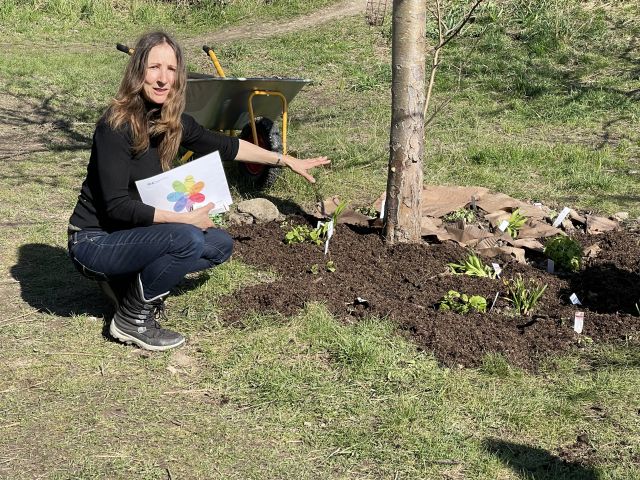
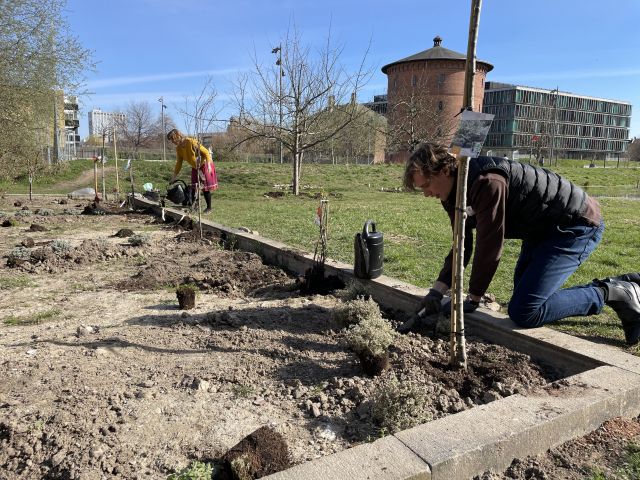
Permaculture is the concept of utilising land, resources, people and the environment in a manner that produces no waste. It encourages the use of closed loop systems and aims to create a mini ecosystem that mimics the way plants and animals naturally grow in the wild. For example, dead plants are left to decompose on the ground, thereby returning the nutrients to the soil.
Permaculture can also teach the concept of resilience.
“If we strengthen our communities and our soil, they’re more resilient,” Isabel Fróes explains. “We’re not approaching it as individuals, but as resilient systems who support each other.
“And from the core concepts of permaculture, we have care for people, care for the Earth, and fair share. These are very much linked to the concept of triple bottom line business models, in which you have the social, environmental, and economic aspects.”
“How can we give more than we take? How can we embed this in our businesses and in our urban development? This is an opportunity to bring these discussions into a different environment and change the way people learn. Learning here might be different than in a classroom.”
Meet the neighbours
Soon they plan to take their students here to start growing plants and vegetables as part of their classes. In the future, they envision a greenhouse and more lectures moving outside.
The garden is not only intended to provide a different place to experience the campus for CBS students and staff. It is also for nearby residents.
“We’re hoping it can be a place where CBS can interact with local residents. Many community members have a lot of knowledge about gardening that they can exchange with us,” says Maribel Blasco.
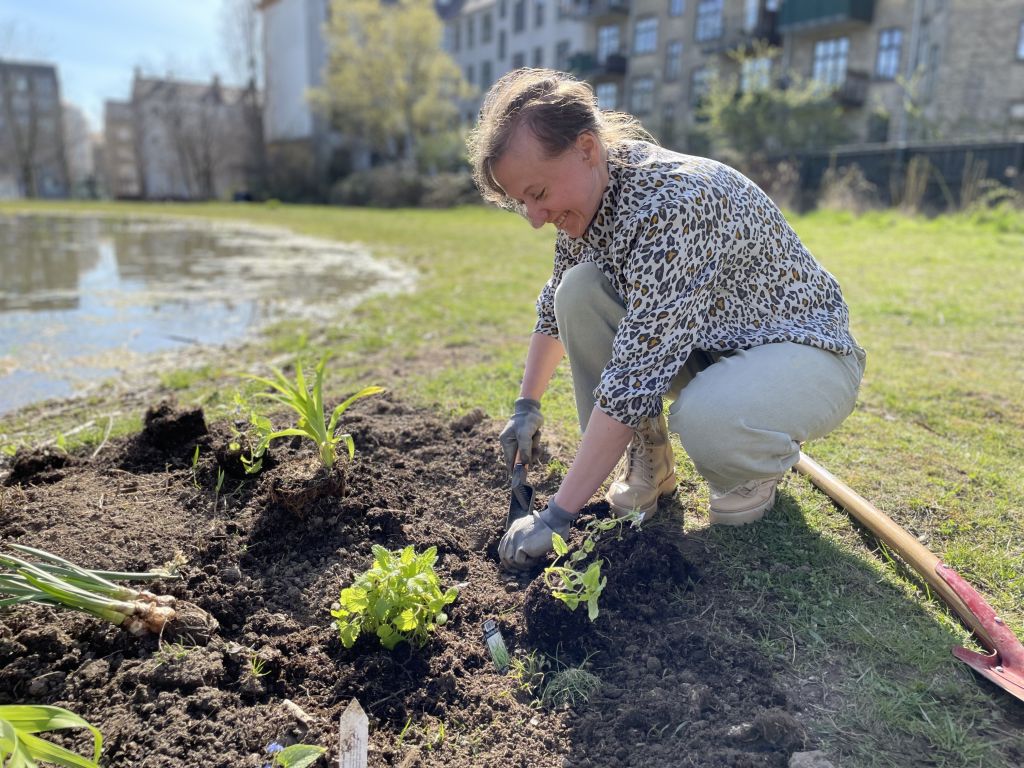
Albina Dioba, a post doc in MSC, sees the permagarden is a natural extension of her research: “I’m researching behavioral economics, how to engage people to pro-environmental behavior. And now I have really a chance to practice this.” Photo: Caroline Hammargren
The garden can break down traditional hierarchies and barriers.
Many neighbours who have visited the garden had never interacted with CBS before, although their apartment building borders on the campus.
“They are now coming down from their balconies,” says Isabel Fróes.
Some have brought them bulbs.
“And they always have smiles on their faces. Maybe they think it’s very funny that there are two academics with rakes,” says Isabel Fróes.
So far, the permaculture garden has 33 registered volunteers – they hope to get more as the project gains traction. Beyond the opportunity to get your fingers dirty in the garden – and eventually harvest vegetables, there will be workshops on permaculture techniques and principles.
Investing in biodiversity
Permahaven has not received any direct funding from CBS – the last prospects diminished with the savings round announced in 2023. However, they have provided the space for the garden, which is on CBS-owned land, and Campus Services prepared the area, built the raised beds and provided composts.
But Maribel Blasco says setting up the garden has given a new perspective on resources beyond the financial.
“We’ve discovered how many resources CBS has in the form of goodwill, energy and imagination, ideas and practical help. You can do a lot with very little. One of our goals is also to see what we can do without monetary resources to the extent possible.”
However, securing external funds is also necessary to buy plants and organise activities, so, when the project started moving, they started applying for funding. So far, the project has secured DKK 100,000 from Frederiksbergfonden, a private fund supporting local activities benefiting the public good.
Frederiksberg municipality has also provided free plants and advice. Increasing biodiversity is a goal for the municipality, which has a whole strategy dedicated to it. “Every square metre counts” it says, outlining ways to create more wild nature “to benefit people and the environment”.
CBS Campus Plan does not specifically mention biodiversity, but it does reference initiatives that reduce CO2 emissions and accommodate the green transition, as well as “long-term sustainable investments in the campus environment and in staff and student well-being”.
Despite climate ambitions, green grass reigns at CBS
Financial constraints are not the only aspects holding back a transformation of the campus. Norms of what a business school should look like are also at play.
In the long term, Isabel and Maribel would like to improve biodiversity on campus even more.
“We think there’s a lot of grass, which is bad for the environment in so many ways,” Isabel Fróes says. She would rather see wildflowers which are more beneficial to pollinators and other wildlife.
But from Campus Services the message was that the areas should look “neat and not wild”.
“That was the message we definitely got from campus services: ‘not wild’.”
What do we use this huge lawn for? Is it because we have a big semester start party every year that we can’t plant anything?
Sebastian Olsson, master's student and permaculture garden volunteer
Sebastian Olsson, a master’s student of management of innovation, agrees.
“CBS has a lot of land, and they’re not frontrunners. There’s no biodiversity,” he points out as he leans on his rake.
He is a member of CBS Climate Club, a student organisation that has supported the Permagarden with marketing and information sharing to get more students involved.
Teaching sustainability he believes is the bare minimum that CBS can do.
“We have all these grass fields, and they’re basically dead. They’re caging nature. I think you could ask CBS the question: our facilities, our campus, is it really green? What do we use this huge lawn for? Is it because we have a big semester start party every year that we can’t plant anything?”
Isabel Fróes thinks this could be changed:
“CBS, like most other business schools, has a vision of how a business school should look that’s not necessarily compatible with the biodiversity agenda. And that’s something we also want to push a little, because it’s so important that we change people’s mind frames about these things. We could be a leading example of how a business school can go all in for biodiversity instead of just image, or a different image, if you like.”
Tending your garden or network?
For Sebastian Olsson, gardening is a way to break with the CBS mentality and some of the demands and implicit values that come with being a business school student.
“I am so tired of sitting in a lecture hall and listening to a guy who figured it all out through some slides. It’s so nice that I can actually do something about it.”
The garden gives him purpose – he is tired of everything being driven by money and finds inspiration in seeing professors come to work on the garden in their free time – although he thinks CBS should be paying them for it.
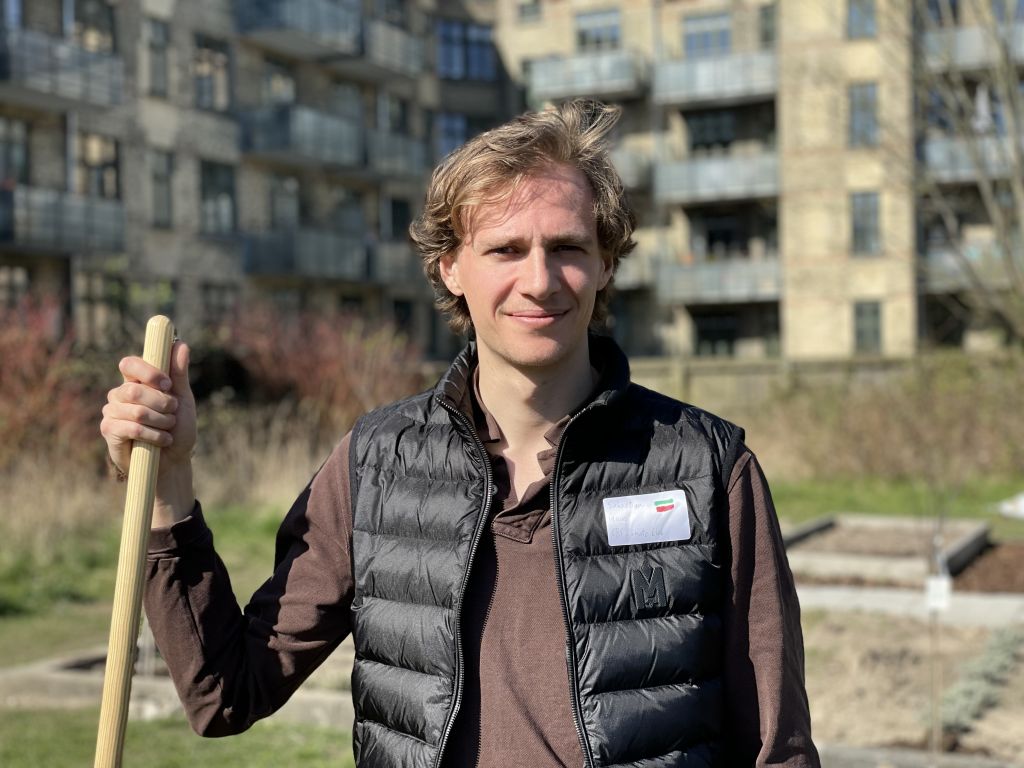
Sebastian Olsson is a master’s student of management of innovation at CBS and permagarden volunteer. Photo: Caroline Hammargren
Now he spends less time on his job and too much on the garden, because he can’t look himself in the mirror and think: “you’re just sitting at an IT company.”
He glances over at Kilen, where the Green Business Forum is in full swing.
“In there, it’s all about building yourself up. Here, it’s not about that. We want to make a difference. It’s not about creating an event. Some consultant coming in and saying ‘follow this model’.
“Imagine the feeling we have here. Then imagine if you sat for an hour in a lecture hall funded by Jysk or Velux or whatever and just like networked. Now, I feel I can stay here for three hours and just get excited.
“I feel like I sound like such a hippie.”
Why is that?
“I think you have to convince yourself because you have this CBS mentality. You need to be at the library, at the office. It’s this fight you have. Like you have to be a good student and then you benefit from it. What benefit? When I’m 50 and every summer I can go to France or something. It’s a rich life. Maybe I can just do things locally. I think that’s like an internal clash I have with myself.
“When you come to these consulting houses, even the green ones, it’s beautiful. Like the smell of the materials. There are cafes, restaurants. There’s this nice jam, nice meat. You feel warm. You get a free coffee. You get free dinner. What you don’t realise is that you’re selling yourself. I’m not saying there’s anything wrong with getting a free dinner. But I think this is my way of saying, okay, I’m going to be a little bit poorer. I’m going to save more money because I’m not working more. I think on the other end I get more happiness.”
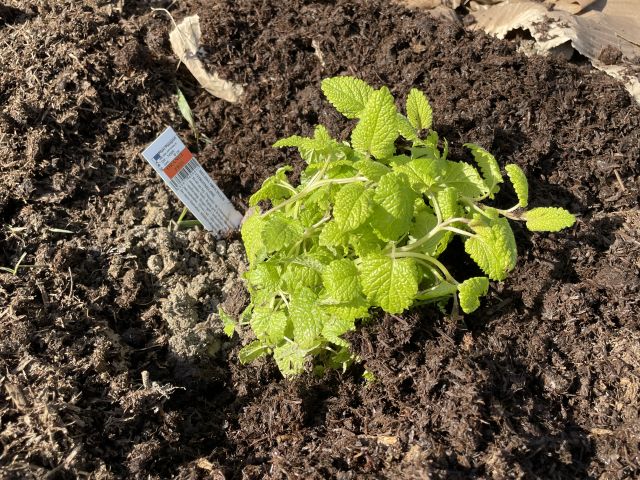
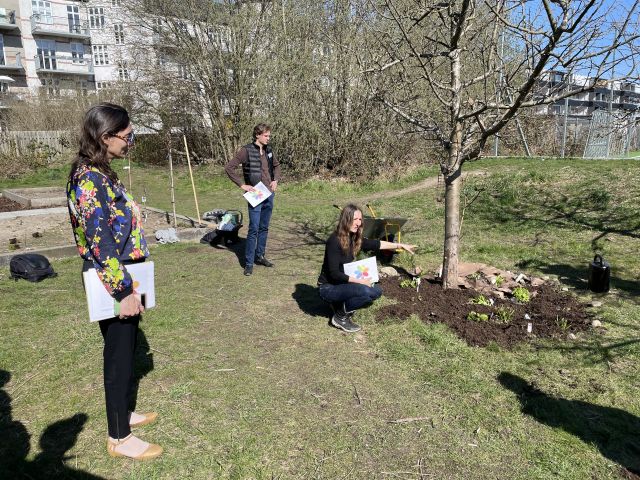
According to science, leaving a clean consulting house to get your hands dirty in the garden might actually make you happy. Research suggests that contact with soil and a specific soil bacteria, Mycobacterium vaccae, triggers the release of serotonin in our brain.
The gardeners gladly inform me of this and provide witty suggestions for article titles: “Have you heard of soil? We can call it the new drug, the black drug… or the brown drug.”
Some of the initial audience have headed on, but others are engaged in sowing seeds on the ground.
The gardeners get to work, spades in the soil. The puddle of accumulated water on the lawn reflects the sunshine – paved surfaces and lack of low-growing vegetation both contribute to standing water.
“I’m so excited to see in a year when hopefully there are many more plants, how they soak up this water and distribute it more naturally,” Sebastian says.
It still looks far from a finished garden – most of the plot is empty, but that leaves room for the imagination. Maribel and Isabel’s goal is to eventually raise enough funds to put a greenhouse here and gradually bring more lectures outside.
“This is pilot project. This is for us to show CBS that we can do this. I think that’s what the teachers are really focused on.”


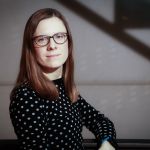
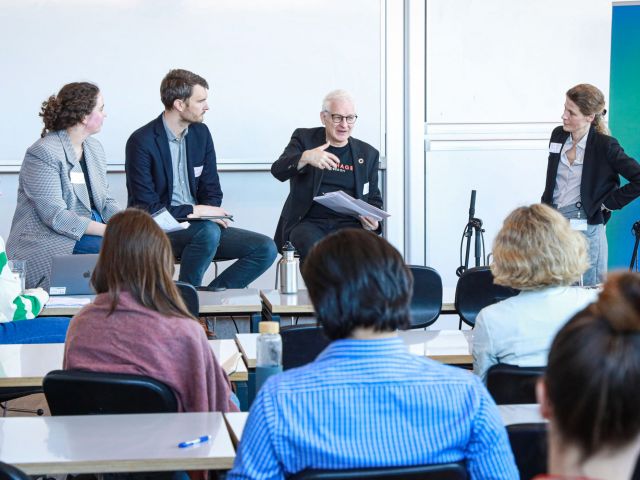
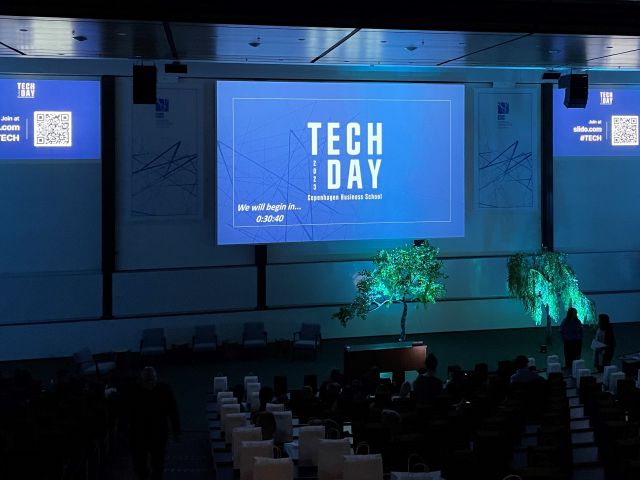
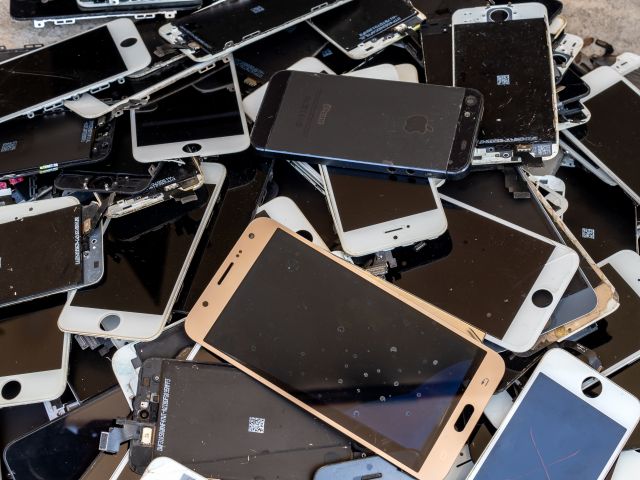
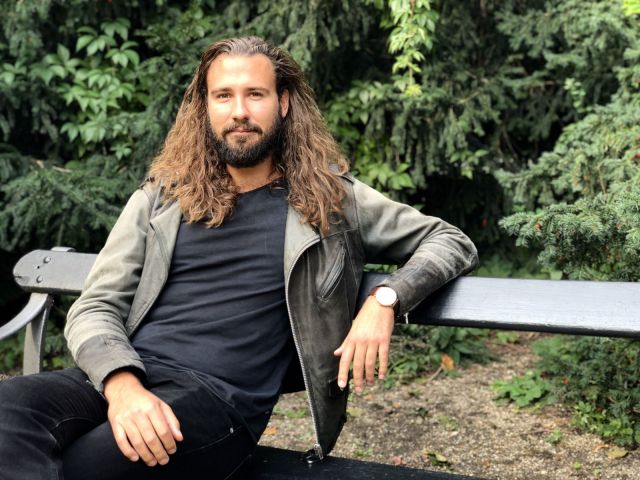
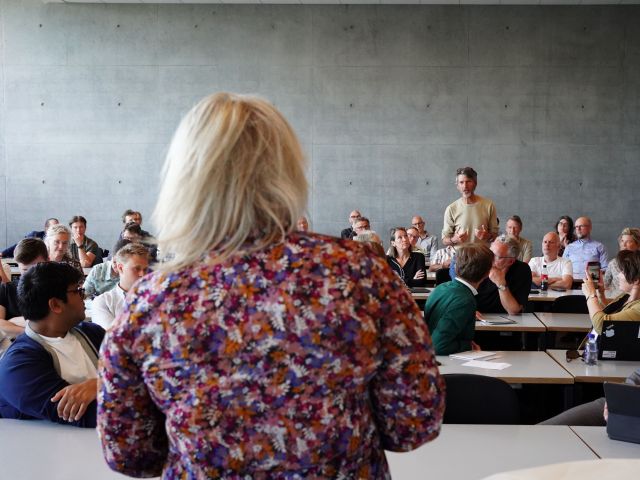
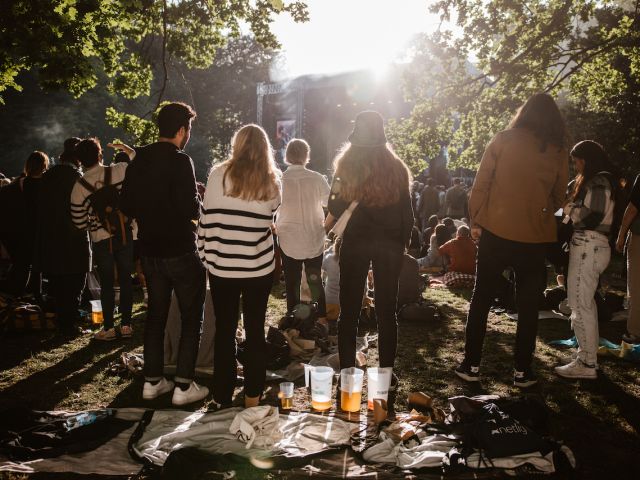




























































































































What a wonderful initiative! Great article! Inspirational faculty and students. Thank you. More biodiversity and less green grass.